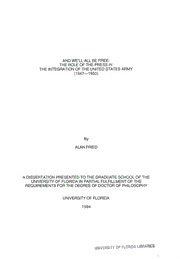
And we'll all be free : the role of the press in the integration of the United States Army PDF
Preview And we'll all be free : the role of the press in the integration of the United States Army
ANDWE’LLALLBEFREE: THEROLEOFTHEPRESSIN THEINTEGRATIONOFTH—EUNITEDSTATESARMY 1947 1950 ( ) By ALANFRIED ADISSERTATIONPRESENTEDTOTHEGRADUATESCHOOLOFTHE UNIVERSITYOFFLORIDAINPARTIALFULFILLMENTOFTHE REQUIREMENTSFORTHEDEGREEOFDOCTOROFPHILOSOPHY UNIVERSITYOFFLORIDA 1994 UNIVERSITYOFFLORIDALIBRARIES ACKNOWLEDGMENTS Icametothisenterprisewithagreatdesiretoleammoreaboutthedevelopmentof racerelationsintheUnitedStates,U.S.militarypolicies,thegrowthofgovernment/press relationsandtheprocessesandmethodsofhistoricalresearch. Ihavelearnedmuch aboutallthesetopicsandIoweagreatdebtofthankstoallthoseilluminatedthewayfor me. Iwouldfirstliketothankthemembersofmydissertationcommittee,Dr.DavidOstroff, Dr.WilliamMcKeen,Dr.RichardScher,Dr.DavidColburnandDr.RobertKendall. Each contributedmightilytomyunderstandingoftheprocessofhistoryandpoliticalscience. I wouldespeciallyliketothankthoselibrarianswhotaughtmewhereandhowtolookfor information: DoloresJenkinsoftheUniversityofFlorida,whoobtainedamicrofilmsetofof theFahyCommitteedocuments,andWillMahoneyoftheMilitaryHistoryDivisionofthe NationalArchivesinWashington,DC,andDennisBilgeroftheHarryS.TrumanLibrary, Independence,Missouri,whowereunstintingintheirkindnessandpatience. Ithank authorsRichardDalfiume,MorrisMacGregorandLeeNicholswhofirstdevelopedthis topic,IalsothankthestaffsoftheMilitaryHistorydivisionoftheArmyWarCollegein CarlisleBarracks,theWisconsinStateHistoricalSocietyandtheLibraryofCongress PersonalManuscriptsDivision. IappreciateallthosewhoputmeupwhileIwasdoing researchincludingMatthewandSueDoddofMarysville,Pennsylvania:LarryEkinof Washington,DC;Mrs.ArmandHelmofIndependence,Missouri;andmyuncleandaunt, AdrianandBarbaraPelznerofReston,Virginia. Finally,IthankmybrotherArthurwho taughtmetoreverehistoryandwhohasalwaysgivenmylifeanethicalbalanceandmy parentsBernardandAnitaFriedforvirtuallyeverythingelse.Thegoodinthisstudy comesfromthem;theerrorsaremyown. 8 TABLEOFCONTENTS page ACKNOWLEDGMENTS ii ABSTRACT v CHAPTERS 1 THEROLEOFPUBLICITYINGOVERNMENT 1 PublicityandthePoliticalElite 4 ABriefReviewofMilitaryDesegregation 12 Notes 15 2 CIVILRIGHTS,MILITARYREFORMANDTHE TRUMANPRESIDENCY 1 CivilRightsandtheTrumanPresidency 22 MilitaryReformandtheTrumanPresidency 45 MilitaryDemocratizationthroughUnification 55 TrumanandthePress 62 Notes 69 3 MILITARYPOLICIES 80 GillemBoard 82 JamesForrestal 85 KennethRoyall 94 OmarBradley 108 J.LawtonColins 121 LouisJohnson 127 GordonGray 133 Conclusions 137 Notes 138 4 A.PHILIPRANDOLPHANDTHECOMMITTEE AGAINSTJIMCROWINTHEARMY 155 RDaensdeoglrpehg'astiEoanrloyfMUilmittaryDesegrationCrusade... 116526 LeagueforNon-ViolentCivilDisobedience 170 Randolph'sInfluenceinMilitaryDesegregation... 176 Notes 178 iii oagfl 5 THEFAHYCOMMITTEE 183 CharlesFahy — 186 SengstackeandtheDefenderTradi:ti;on 188 Firstmeeting 194 SEi.tWua.tiKoennAwnoarltyhsyis 220013 ReactiontoJohnson'sApril6Directive 207 RoyDavenport 210 Johnson'sSecondDirective 210 Johnson’sUsurpation 218 TheThreatofPublicity 226 Notes 235 6 CONCLUSIONS 248 WhytheBureaucratsSubstitutedthePressfor PublicOpinion 252 HowtheBureaucratsViewedtheBlackPress 256 AcceptanceofTruman'sMandate 257 WhyStudytheHistoryofPressAccess? 260 Notes 262 BIBLIOGRAPHY 263 BIOGRAPHICALSKETCH 277 IV AbstractofDissertationPresentedtotheGraduateSchooloftheUniversityOf FloridainPartialFulfillmentoftheRequirementsfortheDegreeofDoctorof Philosophy ANDWE’LLALLBEFREE: THEROLEOFTHEPRESSIN THEINTEGRATIONOFTHEUNITEDSTATESARMY (1947—1950) by AlanFried April 1994 Chairman,Dr.DavidOstroff MajorDepartment:MassCommunications WhenPresidentHarryS.TrumanconvenedthePresident’sCommittee onEqualityofTreatmentandOpportunityintheArmedServicesin1949,he directedtheirworkbedonewithaminimumofpublicity. Consistently,however, thecommitteeandtheircounterpartsintheUnitedStatesArmyusedpress exposureand,moreimportantly,thethreatofpressexposuretogainpolitical advantage. Surprisingly,anumberofthekeyplayersinthisincident,including theExecutiveSecretaryofthecommitteeandacommitteemember, were journalists;thus,membersofthepresswereresponsibleformanagementof government—pressrelations. Byexaminingthehistoryofthepresidential directivetoraciallyintegratetheUnitedStatesArmy,wecang£nafresh understandingofhowpublicityshapesandinfluencespolicy-making. v CHAPTER1 THEROLEOFPUBLICITYINGOVERNMENT In1959,DouglassCateridentifiedatrendthatmightbeoneofthe hallmarksof Americanpoliticallifeinthelasthalfofthetwentiethcentury.“We havetodaywhatmightbecalledgovernmentbypublicity,”Caterwrote.Hesaw theinfluenceofpublicitygrowingasmasscommunicationsandpublicopinion pollingexpandedintoeveryphaseofAmericanlife.Cateridentifiedthistrendas aforceuniquelyindispensabletotheAmericansysteminwhich 'cpoumbpliectiopnigniborna'nicshceaslloefdgoonvedarinlmyetnotarsbuiptrpaotseebdeltywseeepnartahteetawnod coordinatewhatWoodrowWilsoncalledthe'literarytheory'ofour Constitution.1 CommunicationscholarstendtoagreewithCaterandwithDan Nimmowhosaidthatinformation-dispensingbygovernmentusuallyservessome politicalpurpose.Governmentalbodiescraftpromotionalmessagestoexplainand tojustifytheirpolicies;theythentransmitthemtoindividualcitizensandinterest groups.2 Withintheenvironmentofseparatepowers,amarketplaceofideas operatestoallowcompetitivepublicexplanationsofpolicytoviewithother explanations.Asthefirstrecipientofpublicinformation,thepresshasbecomea kindofcitizen'sprocuratordiscriminatingamongthemanymessages.Indoingthis work,thepresshasbecomemorethanacountervailingfourthestateof government;ithasbecomeaseparatepublicuntoitself.AsCaterhasnoted,the 1 2 creativepowerofgovernmentpublicityliesinitsfacilityforusingthepressto short-cuttheclassicwaysofdemocracy.Caterwrote, Inanageofcomplexandfast-breakingevents,themeasurementof publicitycomestobetakenasacheapandconvenientsubstitute forpublicopinion.Forthepoliticianandthebureaucrattheheadline inchfrequentlyservesastheday-to-daymeasureofpublicopinion onagreatnumberofissues.Bytheirresponsestothissynthetic publicopinion,theystimulatefurtherpublicityandsocommencea reflexivecyclethathasbeenknowntomovenewsstoriesfromthe insidetothefrontpageandtoreshapepoliciesassurelyasif publicopinionhadexerteditssovereignwill.3 Totesteater'sthesisthattheexpediencyofpublicitydrives(and perhaps,obstructs)policymaking,wehavedecidedtoexaminetheextentto whichtheseprocessesarepeculiartothe“ageofcomplexandfast-breaking events."Forthisanalysis,weneedtowresttheprocessfromitscontemporary connotations. Wearestilldefiningthepolicymakingprocessinaverytraditional way,butwearesuggestingthatthedispositionofthatprocesshaschanged. Thatis,operationally,wewouldacceptanyviewoftheprocessthatincludes(a) problemidentification,(b)theformulation,legitimationandappropriationthat compriseprogramdevelopment,(c)programimplementation,(d)program evaluationand(e)programtermination.4Thedistinctionthatwearemakingisthat thisprocesshasrundifferentlysincethetelevision-age. Muchoftheacademicliteratureabouttheeffectsofpublicityonpolicy- makinghasnaturallyfocusedoneventsthatoccurredafter1960.PresidentJohn Kennedy’sabilitiesasatelegeniccommunicatorandthegraphic,publicqualityof hisassassinationhaveforevertransformedthemedia.Relativelyrecentevents suchasthe1960sCivilRightscrusades,theVietNamWarandtheWatergate affair,andtheeventsthathaveoccurredintheiraftermathwerealsopowerful naturallodestonesattractingtheeyeofthevideocameraandtheattentionofmost 3 politicalscientistsandcommunicationscholars.Yetthesedramaticeventshave,to someextent,obscuredourunderstandingofthegovemment/publicityprocess. RobertEntmanarguesthatfederalpolicymakerswerebetterableto resolvedifficultmattersinternally,withintheWashingtonsystem,beforetheglaring concentrationofintrusiveandjudgmentalnewscoverageimposedanextralayer ofstrategiccomplexityontheirdecisions: Presidentsandlegislatorscouldconcentratemoreonsellingthepartyelite andlocalactivists,whounderstoodthecomplexityofpolicychoiceand resistedthedemagogicmanipulationbytheopposingparty.Publicopinion e(olppiietnreicsoenmi.vaeyBdebofreoramecotturhaele)attewltoeeuvnlitsdiivotenatgahgaaeln,oenbvgaeocrrktnowohtweh.nat.po.tlhBieteiyccaapleuprsaceretioivfeesthaheselmpdeudmbiloair,ce power,apresident'simagebeyondthePotomaccouldbelessfavorable thanhisprofessionalreputationinWashingtonandhecouldstilldominate theWashingtonpowergame. Now,maintainingthatsituationismore dapiusfbfliifciutclhts.euyNpaoprower,.tehMvaaesnnabgifeitcnhogemmpeuebdoliniaeciiosfmpntrohetesacsleinwotanrysasltottaubsnoklessdtoeifnr,pppreoerlsciietdiiecvnieatdnssaabnneddhaaoctvtheuearl politicians.5 Entman’sconceptionhelpstonarrowthefocusofthisinquirybothintime andineffect.Tounderstandtheconsequencesofpublicityonpolicy-making,we needtoexamineincidentsthatoccurredbeforetelevisionpokeditsdisruptiveeye intothepoliticalprocess.IfEntmanisright,thepublicitymachinehasmostaffected the activitiesoftheelite.Whetherforgoodorforill,thisnewsensitivitybythe elitestopublicitymayhavechangedthespiritofdecision-makinginourpluralistic society.Toseeifthistrue,weneedtoexaminehowelitepolicymakersfunctioned withoutpublicity,orbetteryet,howtheyfunctionedwhenpublicitywasnotas problematic. 4 PublicityandthePoliticalElite EversinceKatzandLazarsfeldtheorizedtheexistenceofatwo-stepflow incommunication,6thepoliticalelitehaveusuallybeenseenasanintermediary betweentheinformationgeneratedbythemassmediaandthepublicatlarge. Althoughresearchershaveclearlyarticulatedandprovenempiricallythat atwo- stepflowofcommunicationsoccursinmanysituations,theyhavebeenlessclear inhowtheydefineelite.WewouldadoptV.O.Key’sdefinition,“Thatthinstratum ofpersonsreferredtovariouslyasthepoliticalelite,thepoliticalactivists,the leadershipechelonsortheinfluentials.”7 Althougheconomicstatusmaybea determinantofwhois,andisnot,amemberoftheelite,BernardHennessysaid onmostmattersofpublicconcern,therelationsbetweentheeconomicand thepoliticalaremuchtoosubtletobecapturedbyanydeterminist prescription,andmuchinterwovenbyothersocialandpsychological forces. 8 PerhapsHennesydescribesitbestwhenhesuggeststhatpoliticalelites arethosewhoseopinionsmatter.Thus,opinionleaderscaremoreintenselyabout theendsandmeansofpublicpolicyandholdtheiropinionswithgreater articulateness,self-consciousnessandwithgreaterpersistence.9WhereEntman differsfromthesescholarsisinhisperspective;heseesthemediaasan impedimenttothegoodworksoftheseelites. Thenotionthatelitesdependuponthemediatomirrorpopularopinionhasbeen widelyaccepted.10Thestructureandfunctionofthisfeedbackphaseofthetwo-step flowbetweenthemediaandtheelitehasbeenwellanalyzed.Forexample,DorisGraber hasinvestigatedhowthemediaaffectsdecision-making: Publicitymaynarrowthepolicychoicesavailabletopublicofficials.Itmay engenderactionwhennoactionmayhavetakenplaceotherwise. 5 Alternativelybymobilizinghostilepublicorinterestgroupopinions,itmay forceahalttoongoingorprojectedpolicies.11 Wecontendthatmuchofthecurrentanalysismaybebasedon misapprehensionsand symbolicprojection.Ifthepoliticalelitedorelyonthemediaasthe voiceofthepeople,theyprobablyhavefalsenotionsofitsrepresentativeness.J.David Kennemarnotesthatelitesoftenusethenewsmediaasasurrogateforpublicopinion althoughthereisnoscientificevidencethatthenewsreflectsanythingmorethanone measureofthepopularagenda.Inderivingthisinsight,theseelitesusenosystematic meanstoshapetheseperceptions.Inholdingtheseunwarrantedassumptions,they exhibitahighdegreeofpluralisticignorance.12 SamuelKemellblamestheintrusionofthepressintotheaffairsofpolicymakersfor creatingasea-changeinournotionsofpluralism.He arguesthatmodempoliticiansare caughtbetweenthestructureofinstitutionalizedandindividualizedpluralism,wherethe formerischaracterizedbystablebargainingofallocatedresourcesbyanetworkof coalitionsbasedonlong-termloyaltiesandwherethelatterischaracterizedby independentnewtradersmoreinterestedinshorttermsuccesses.Thesecondpolitical milieuisalsodistinguishedbygreatercommunicationfromWashingtontotherestofthe country.PublicopinioncountsformoretodaybecauseWashingtonelitesarenecessarily moresensitivetopublicandpressopinion.13 WalterLippmannsawthedangersofthisdivisionintheearly1950s.Hewrote, Thepressisnosubstituteforinstitutions.Itislikethebeamofa searchlightthatmovesrestlesslyabout,bringingoneepisodethen anotheroutofthedarknessintovision.Mencannotdotheworkof theworldbythislightalone.Theycannotgovernsocietyby esptiesaoddyelsi,ghitnocfidtehenitrsoawnnd,etrhuaptttihoensp.reItssis,ownhleynwhtuernnetdheuypownortkhebmy,a revealsasituationintelligibleenoughforapopulardecision.Itliesin socialorganizationbasedonasystemofanalysisandrecord,andin allthecorollariesofthatprinciple;intheabandonmentofthetheory
